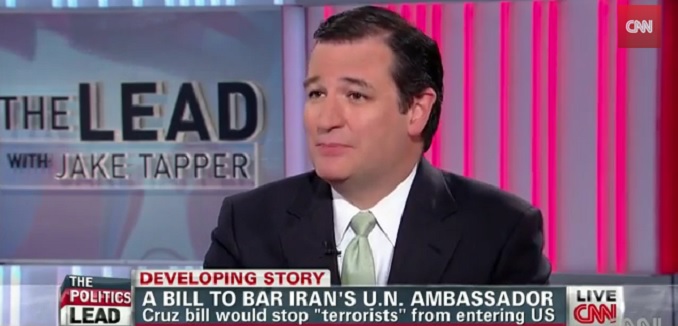The Senate Monday night voted by unanimous consent to deny entry to the United States to persons who had engaged in espionage or terrorism against the U.S., a move aimed at barring Hamid Aboutalebi – Iran’s pick for United Nations ambassador – from acquiring a visa to take up his post.
Aboutalebi was a member of the Muslim Student Followers of the Imam’s Line in 1979, when the group seized Washington’s Tehran embassy and held scores of Americans hostage for 444 days. His appointment had quickly generated pushback from U.S. lawmakers, amid assessments that allowing Aboutalebi to serve in New York on Iran’s behalf would be seen by U.S. allies as evidence that the Obama administration was “willing to ignore Iranian misbehavior in our pursuit of a nuclear accord.”
The Associated Press noted that Monday night’s voice vote saw “Republicans and Democrats united behind the legislation,” which had been sponsored by Sen. Ted Cruz (R-TX):
Cruz won the tacit support of Sen. Chuck Schumer, D-N.Y., for his legislation. The two shook hands on the Senate floor, a rare bit of bipartisanship for Cruz, a Tea Party stalwart, and the No. 3 Democrat in the Senate.
“It may be a case of strange bedfellows, but I’m glad Sen. Cruz and I were able to work out a bill that would prevent this terrorist from stepping foot on American soil,” Schumer said in a statement. “We ought to close the door on him, and others like him, before he even comes to the United States, and that’s exactly what this bill will do.”
Parallel legislation in the House, which must be approved before the bill goes to President Barack Obama for his signature, has already been introduced:
Last night, Congressman Lamborn introduced H.R. 4357, a House companion bill to S.2195 sponsored by Senator Ted Cruz of Texas. This legislation would prevent those who are known terrorists from obtaining visas to enter the United States as ambassadors to the United Nations.
“America should not willingly accept into our country a diplomat who helped hold American diplomats hostage. Diplomatic immunity should not apply to terrorists. The only way terrorists should be allowed into our country is if they are coming to face justice. The President can already deny visas to diplomats for spying. Terrorist activities by diplomats, past or present, should be dealt with just as severely,” said Lamborn.
The controversy over Aboutalebi has emerged as a proxy for criticism over the administration’s approach to Iran in general. Officials and analysts linked to the White House have leaned heavily on the argument that Congress cannot impose new pressure on Iran lest it spoil a “spirit of Geneva” necessary for continued nuclear talks, Geneva being where the interim Joint Plan of Action (JPA) was inked. Tehran’s move to nominate Aboutalebi has been read as a signal that the Iranians are not inclined to be as circumspect in maintaining a positive atmosphere.
[Photo: CNN / YouTube]




